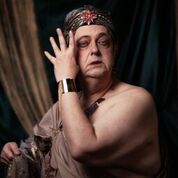Writer: Claire Kiechel
Director: Steve Cosson
Reviewer: Carrie Lee O’Dell
In a program note for Paul Swan is Dead and Gone, playwright Claire Kiechel recalls the first time she heard about her great-great uncle Paul Swan, who her grandmother described as “very strange”; in the parlance of Kiechel’s native Nebraska she understood that to mean he was “loud, queer, and lived, for some awful reason, in New York City.” Paul Swan was a dancer, visual artist, and poet; in his youth, he danced in Europe where marquees called him “The Most Beautiful Man in the World.” He remained active as a dancer well into his eighties, starring in Andy Warhol films and holding weekly salons in a Carnegie Hall studio. The Civilians’ latest offering, Paul Swan is Dead and Gone, invites the audience to one of these salons, an intimate gathering at Torn Page, an event space in a Chelsea brownstone. Steve Cosson directs.
Paul Swan is Dead and Gone opens with Paul Swan’s piano player/personal assistant, Bellamy, (Robert M. Johanson) first greeting the audience, then stalling for time when Paul fails to make his entrance. Assisting Bellamy are Flora(Helen Cespedes) and Paula (Alexis Scott), who perform dances, songs, and poems while the piano player looks for the man of the hour. When Paul Swan (Tony Torn) finally appears, we see he is an aging dancer still wearing the revealing costumes of his youth. Over the course of his salon, he dances, recites poetry, sings, and tells stories ofhis life.We learn about his family, his sexuality, and his relationship with his piano player.
Flora(Helen Cespedes) and Paula (Alexis Scott), who perform dances, songs, and poems while the piano player looks for the man of the hour. When Paul Swan (Tony Torn) finally appears, we see he is an aging dancer still wearing the revealing costumes of his youth. Over the course of his salon, he dances, recites poetry, sings, and tells stories ofhis life.We learn about his family, his sexuality, and his relationship with his piano player.
This play does nothing badly unintentionally. Dan Safer choreographs delightfully dated dances that feel a bit like The Dude’s landlord’s dance cycle from The Big Lebowski. Costumes by An-Lin Dauber—from Paul Swan’s faux Greco-Roman dance outfits to Bellamy’s Death of A Salesman style shabby suit—are appropriately trapped in time. When Flora and Paula appear dressed as Susan Sontag and James Purdy, their commentary on the nature of camp is as apt as it is funny. All this ridiculousness is in sharp contrast to the fact that Paul is battling loneliness and his own mortality, that Bellamy is part of a long line of piano players who are lackluster replacements for a young man far in his past, and that Paul’s past as a Nebraska farm boy makes him push that much harder against obsolescence, which was his greatest fear.
Performances are strong throughout. As Paul Swan, Tony Torn expertly channels the energy of the man who told Warhol’s camera, “I am the most famous unknown person in New York.” As Bellamy, Robert M. Johanson complements Torn’s Paul Swan with a performance that is, at turns, screamingly funny and achingly poignant; he also worked with sound designer Avi A. Amon to compose the songs that set Swan’s poems to music. Helen Cespedes and Alexis Scott show excellent comic timing as Flora and Paula. The choice to make this an immersive work by staging it at Torn Page makes the audience that much closer to the characters; we’re laughing at Paul Swan, but we’re guests in his studio. Andromache Chalfant’s set nicely captures the sense that this space was once opulent but has faded over the years.
Claire Kiechel has taken her uncle’s work—his correspondence, his writing, Warhol’s films—and used that to tell a more universal story, that of finding one’s place in the world and fighting to be heard, to be remembered. It’s a beautiful evening of theatre that should not be missed.
Runs Until May 19, 2019 | Image: M. Sharkey





